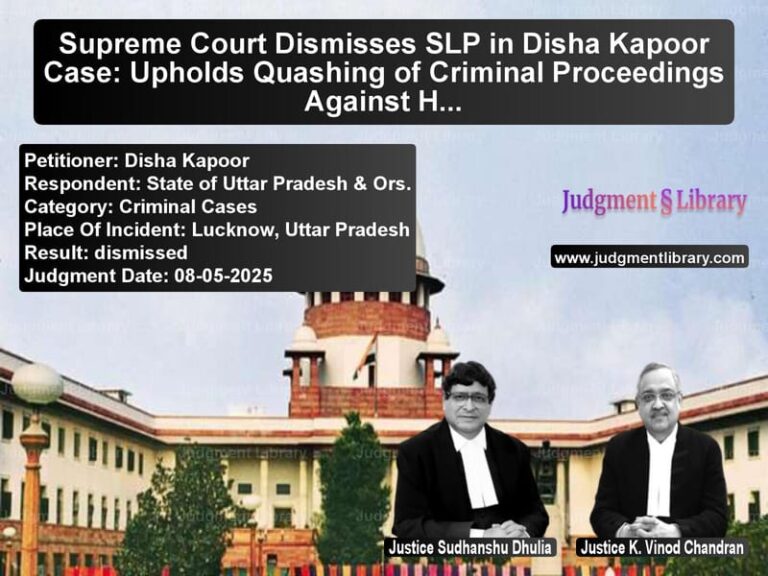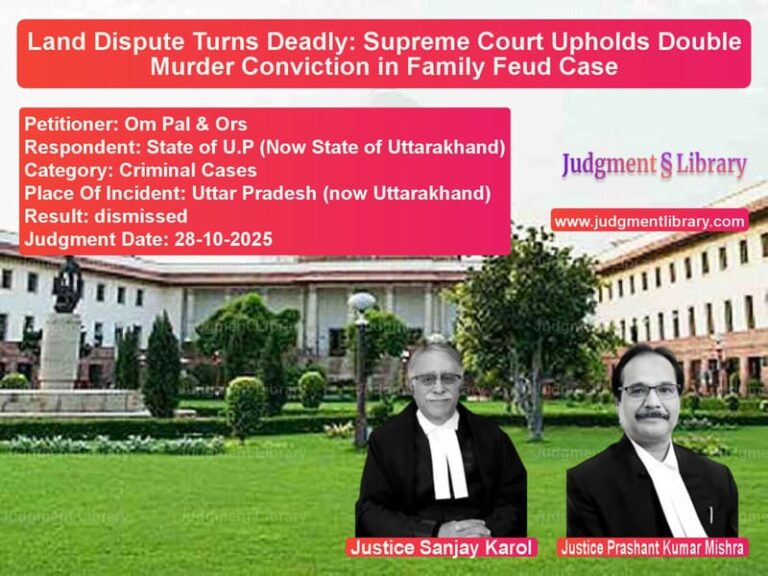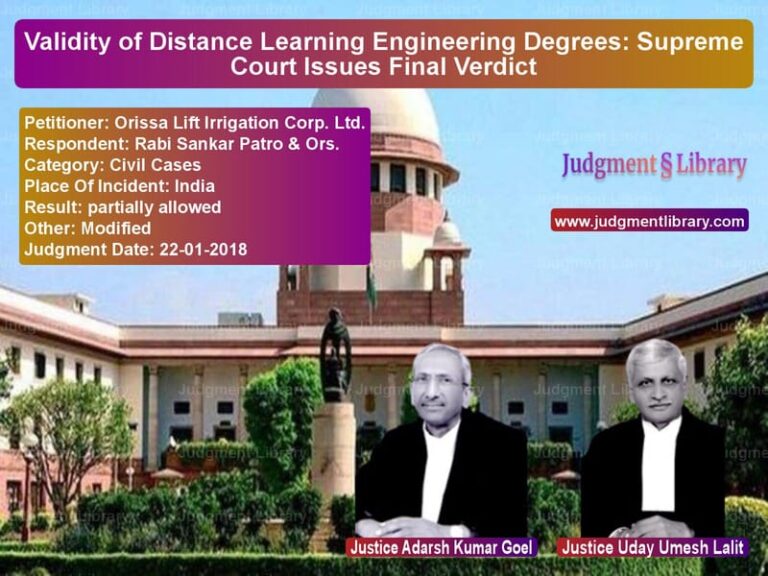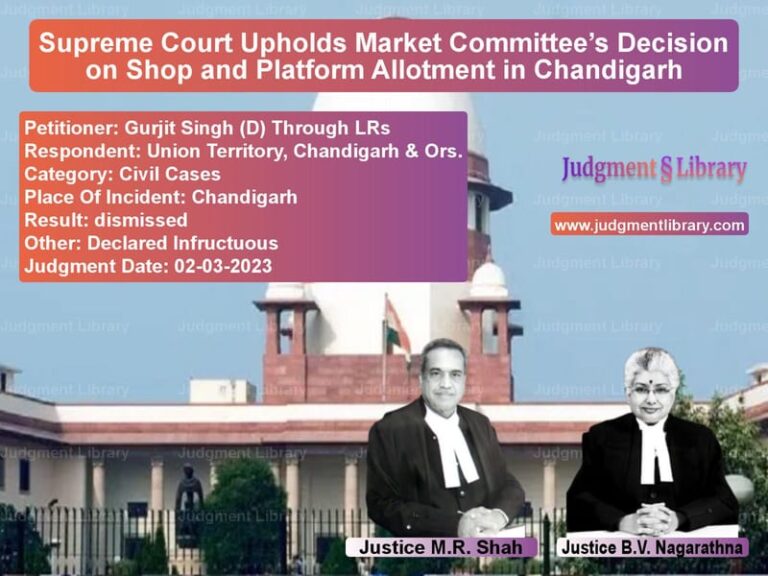Supreme Court Directs Strict Implementation of Right to Information Act
The Supreme Court of India, in the landmark case of Kishan Chand Jain v. Union of India & Ors., addressed the crucial issue of transparency and accountability under the Right to Information (RTI) Act, 2005. The case was filed as a Public Interest Litigation (PIL) under Article 32 of the Constitution, seeking the enforcement of the obligations of public authorities under Section 4 of the RTI Act.
Background of the Case
The petitioner, Kishan Chand Jain, filed a PIL urging the Supreme Court to issue directions ensuring proactive disclosure of information by public authorities under Section 4 of the RTI Act. The petition highlighted the lack of implementation of mandatory disclosures by government bodies, making it difficult for citizens to access essential public information.
The key events leading to this judgment are as follows:
- 2005: The RTI Act was enacted to promote transparency and accountability.
- 2011: The Department of Personnel and Training (DoPT) constituted a Task Force to improve RTI compliance.
- 2013: Guidelines were issued, mandating proactive disclosures by public authorities.
- 2019: The government reiterated the need for transparency audits through an official memorandum (OM).
- 2021: The petitioner approached the Supreme Court, citing widespread non-compliance.
- August 17, 2023: The Supreme Court ruled in favor of enforcing the RTI Act’s proactive disclosure requirements.
Key Legal Issues Considered
- Whether public authorities are complying with Section 4 of the RTI Act.
- Whether proactive disclosure should be mandated through third-party audits.
- The role of the Central and State Information Commissions in enforcing compliance.
- Whether the judiciary should intervene in administrative enforcement of the RTI Act.
Arguments by the Petitioner
The petitioner, represented by Senior Advocate Prashant Bhushan, argued:
- Public authorities are failing to comply with the mandatory disclosures required under Section 4 of the RTI Act.
- Government websites lack transparency, and crucial information is often unavailable.
- There is no effective mechanism to monitor compliance, leading to widespread corruption and inefficiency.
- The Central and State Information Commissions should be directed to ensure strict implementation through periodic audits.
Arguments by the Respondents
The Union of India, represented by Attorney General R. Venkataramani, contended:
- The government has issued multiple guidelines and memorandums to ensure compliance.
- Most public authorities are adhering to their RTI obligations, with 95% reporting compliance in annual returns.
- Third-party audits have been introduced, but the process takes time to implement across all departments.
- The judiciary should not interfere in policy implementation, as it falls within the executive domain.
Supreme Court’s Analysis and Judgment
1. Mandatory Nature of Section 4
The Court reiterated that proactive disclosures under Section 4 are not optional but a statutory obligation.
“Transparency is a fundamental principle of governance. The right to information empowers citizens and ensures accountability in public administration.”
2. Need for Effective Monitoring
The Court found that mere issuance of guidelines is insufficient and emphasized the need for strict monitoring.
“The Central and State Information Commissions must ensure compliance through continuous monitoring and enforcement mechanisms.”
3. Third-Party Audits
The Court directed that all public authorities must conduct third-party audits to assess their compliance with RTI obligations.
“Every public authority shall undergo an independent transparency audit, and the findings shall be published on government websites.”
4. Role of the Information Commissions
The Court underscored the accountability of the Central and State Information Commissions.
“These Commissions must not remain passive. They shall play an active role in enforcing compliance and addressing grievances.”
Supreme Court’s Final Decision
The Supreme Court issued the following directives:
- The Central and State Information Commissions must ensure full implementation of Section 4 of the RTI Act.
- Every public authority must conduct annual third-party audits and publish the results online.
- Public authorities must ensure that their websites provide updated and accurate information.
- The government must submit periodic reports on RTI compliance to Parliament and State Legislatures.
Conclusion
This ruling reinforces key legal principles:
- Transparency is non-negotiable: The government must proactively disclose information to the public.
- Accountability mechanisms must be strengthened: The Information Commissions have a duty to ensure compliance.
- Judicial intervention is necessary when rights are undermined: The Supreme Court played a crucial role in safeguarding citizens’ rights under the RTI Act.
This judgment sets a precedent for ensuring transparency in governance and empowering citizens with the right to access information.
Petitioner Name: Kishan Chand Jain.Respondent Name: Union of India & Ors..Judgment By: Justice Dhananjaya Y Chandrachud, Justice Pamidighantam Sri Narasimha, Justice J.B. Pardiwala.Place Of Incident: India.Judgment Date: 17-08-2023.
Don’t miss out on the full details! Download the complete judgment in PDF format below and gain valuable insights instantly!
Download Judgment: kishan-chand-jain-vs-union-of-india-&-ors-supreme-court-of-india-judgment-dated-17-08-2023.pdf
Directly Download Judgment: Directly download this Judgment
See all petitions in Fundamental Rights
See all petitions in Public Interest Litigation
See all petitions in Constitution Interpretation
See all petitions in Judgment by Dhananjaya Y Chandrachud
See all petitions in Judgment by P.S. Narasimha
See all petitions in Judgment by J.B. Pardiwala
See all petitions in allowed
See all petitions in Declared Infructuous
See all petitions in supreme court of India judgments August 2023
See all petitions in 2023 judgments
See all posts in Constitutional Cases Category
See all allowed petitions in Constitutional Cases Category
See all Dismissed petitions in Constitutional Cases Category
See all partially allowed petitions in Constitutional Cases Category







